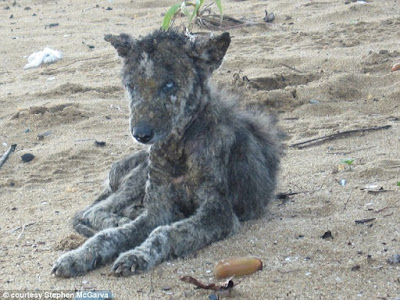Dead Dog Beach
"As I looked around, taking in the extraordinary beauty of the place, I started to notice a lot of garbage along the perimeter. I wondered how someone could just toss a McDonald's wrapper on the sand in such a beautiful place.
In the near distance, I spotted some sort of animal lying in the sand. I could kind of make out four legs and a skinny, furless tail, but that was all. I dropped my gear where I stood and headed toward it. As I got closer, my heart dropped and a wave of nausea surged through me. It was a dog, or what was left of one. His rib cage was visible through the sparse tufts of dark fur; he was so sunburned on the areas where the fur had fallen out that the skin was split and bloody. His ears and snout were knobby and covered in calluses.
I looked around for something I could use as a shovel to bury him. I've always believed that every creature deserves dignity in death.
And then the dog raised his head and wagged his tail."
So begins Stephen McGarva's two-year journey (from 2005-2007) on Playa Lucia, aka Dead Dog Beach, a dumping ground for the dogs the Puerto Rican people no longer wanted in their lives. It is only one of many places on Puerto Rico where people get rid of their dogs, but it was (and still is, no doubt) the most notorious. It's located in one of poorest counties on the southern end of the island. This is an excerpt from McGarva's book "The Rescue at Dead Dog Beach: One Man's Quest to Find a Home for the World's Forgotten Animals."
McGarva didn't set out to be an animal rescuer; he stumbled upon atrocity and decided to do something about it. But there were many men who were against anyone taking care of these starving and destitute dogs. McGarva was warned by decent citizens to abandon the dogs because there were those who would harm him for feeding and loving these thrown-away dogs at Dead Dog Beach, which just happened to be near some fancy tourist hotels.
You know how some things you see or read about or hear can never be forgotten; the images, the words crawl into your bones and haunt you for the rest of your life, maybe not every day, but in the quiet moments when the story of your life surges forward from underneath all the everyday mundaneness of living. What happened in the 217 pages of this book now lives in my DNA. I can never forget Dead Dog Beach, for it still lives on, although somewhat differently than when McGarva spent two years giving his all for those abused and discarded dogs.
As long as human beings believe the lives of animals are worthless, just bodies to machete, shoot, poison, hang, burn alive, crush with cars, starve, pull apart with pickup trucks -- there will always be a Dead Dog Beach, in Puerto Rico and around the world.
In the near distance, I spotted some sort of animal lying in the sand. I could kind of make out four legs and a skinny, furless tail, but that was all. I dropped my gear where I stood and headed toward it. As I got closer, my heart dropped and a wave of nausea surged through me. It was a dog, or what was left of one. His rib cage was visible through the sparse tufts of dark fur; he was so sunburned on the areas where the fur had fallen out that the skin was split and bloody. His ears and snout were knobby and covered in calluses.
I looked around for something I could use as a shovel to bury him. I've always believed that every creature deserves dignity in death.
And then the dog raised his head and wagged his tail."
So begins Stephen McGarva's two-year journey (from 2005-2007) on Playa Lucia, aka Dead Dog Beach, a dumping ground for the dogs the Puerto Rican people no longer wanted in their lives. It is only one of many places on Puerto Rico where people get rid of their dogs, but it was (and still is, no doubt) the most notorious. It's located in one of poorest counties on the southern end of the island. This is an excerpt from McGarva's book "The Rescue at Dead Dog Beach: One Man's Quest to Find a Home for the World's Forgotten Animals."
McGarva didn't set out to be an animal rescuer; he stumbled upon atrocity and decided to do something about it. But there were many men who were against anyone taking care of these starving and destitute dogs. McGarva was warned by decent citizens to abandon the dogs because there were those who would harm him for feeding and loving these thrown-away dogs at Dead Dog Beach, which just happened to be near some fancy tourist hotels.
You know how some things you see or read about or hear can never be forgotten; the images, the words crawl into your bones and haunt you for the rest of your life, maybe not every day, but in the quiet moments when the story of your life surges forward from underneath all the everyday mundaneness of living. What happened in the 217 pages of this book now lives in my DNA. I can never forget Dead Dog Beach, for it still lives on, although somewhat differently than when McGarva spent two years giving his all for those abused and discarded dogs.
As long as human beings believe the lives of animals are worthless, just bodies to machete, shoot, poison, hang, burn alive, crush with cars, starve, pull apart with pickup trucks -- there will always be a Dead Dog Beach, in Puerto Rico and around the world.



Comments